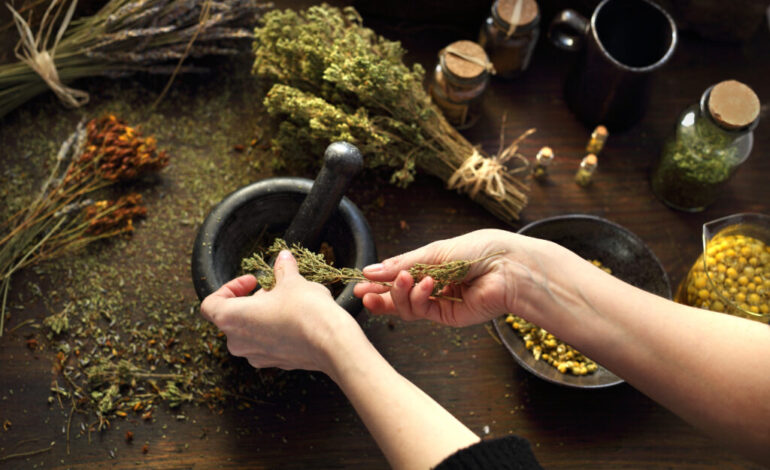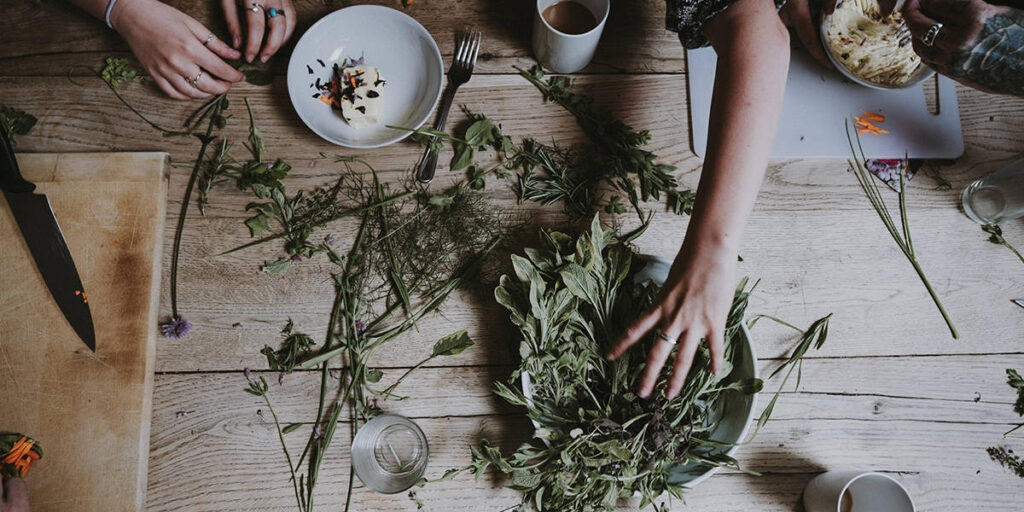
In a world increasingly dominated by pharmaceuticals and synthetic remedies, there is a growing resurgence of interest in traditional herbalism as a holistic approach to modern wellness. Herbalism, the ancient practice of using plants for medicinal purposes, has deep roots in cultures worldwide. Today, as people seek more natural and sustainable alternatives, traditional plants are gaining prominence for their diverse therapeutic benefits.
The Wisdom of Traditional Herbalism
Traditional herbalism is like a timeless handbook for well-being, filled with wisdom that has journeyed through generations. Think of it as a family recipe passed down from your grandparents to your parents and now to you. From Ayurveda in India to Traditional Chinese Medicine, and the indigenous practices in Africa and Native American communities, herbalism has been a reliable companion for countless people. Picture it as a global conversation where communities, over time, have exchanged notes on what works best from the plants around them.
In these traditions, there’s a shared belief that our bodies are not just a collection of parts but a holistic system where everything is interconnected. It’s like realizing that your mind, body, and spirit are all part of the same team. This holistic view sets the stage for a more comprehensive approach to health. It’s not just about fixing one thing; it’s about creating a balance that resonates through every part of you.
Key Traditional Plants for Modern Wellness

Turmeric (Curcuma longa): Originating from Ayurveda, a time-tested Indian health system, turmeric has earned its stripes globally. Why? Well, it’s not just about adding color to your curry. Turmeric packs a punch with its active compound called curcumin. Now, curcumin isn’t some mysterious magic; it’s a natural warrior against inflammation and a staunch defender of your immune system.
If you’re dealing with arthritis and its aches, turmeric might be your new best friend. It doesn’t promise overnight miracles, but it’s like a reliable companion that helps ease those discomforts over time. Plus, it doesn’t stop there — it’s got your immune system’s back, working to keep it strong and resilient. And here’s the beauty of it — you don’t need a special ceremony or secret handshake to incorporate turmeric into your routine. Whether it’s a sprinkle in your cooking or a warm cup of turmeric tea, this herb is all about simplicity and effectiveness.
Echinacea (Echinacea purpurea): Think of echinacea as your body’s ally in the fight against those pesky colds and respiratory bugs. It doesn’t have a magic wand to make them disappear, but it’s like giving your immune system a boost, an extra set of soldiers ready to defend.
This isn’t a newfangled trend; echinacea has been a trusted part of traditional medicine for generations. When people talk about immune support, it’s not about tricking your body or relying on some mysterious force. It’s about understanding that your immune system is a powerhouse, and echinacea is like a reinforcement — making sure it’s in top-notch shape.
Ashwagandha (Withania somnifera): Ashwagandha is like your body’s cool, calm, and collected friend, especially when stress is knocking on your door. Life gets overwhelming, and that’s where this adaptogenic herb steps in. Adaptogenic might sound fancy, but all it means is that ashwagandha helps your body handle stress in a smoother way — not by erasing it, but by giving you an extra layer of resilience.
Ever feel like your hormones are doing a cha-cha dance, causing chaos? Ashwagandha is often turned to for support in maintaining hormonal balance. It’s like a friendly referee helping to keep things in order, ensuring your body functions harmoniously. And when it comes to your brain’s powerhouse — cognitive function — ashwagandha is like a quiet cheerleader. It’s not about turning you into a genius overnight, but it’s believed to lend a helping hand in keeping your mental gears running smoothly.
Lavender (Lavandula angustifolia): Lavender, with its soothing scent, is like a deep breath for your soul. Used in various traditions, it’s not a mystical remedy but a practical one. When stress is knocking at your door, lavender is there to offer a sense of calm. It doesn’t erase your problems, but it’s like a comforting friend, helping you face them with a bit more ease.
Anxiety can feel like a storm in your mind, and that’s where lavender steps in. It’s not about waving a wand to make worries disappear; it’s about providing a gentle, natural support to help ease that mental turbulence. Picture it as a gentle breeze, settling the chaotic waves of anxious thoughts. And when it’s time to hit the hay, lavender becomes your sleep buddy. It’s not a promise to knock you out like a heavy-duty sleep aid, but rather a subtle invitation to tranquility. Its calming effects make it a popular choice for those looking to enjoy a restful night’s sleep.
Cultivating a Connection with Nature

Growing, harvesting, and preparing herbs — it might sound like a chore, but trust me, it’s like a secret doorway to a world of benefits. Picture this: as you plant those seeds or nurture that little herb on your windowsill, you’re not just growing a plant; you’re growing a connection with nature. It’s like tapping into the roots of life itself.
Harvesting those leaves or flowers becomes a mindful act, not just a routine task. You start to notice the rhythm of nature — the way the seasons change, the growth cycles of plants, and the quiet beauty in each phase. It’s not just about the end product; it’s about the journey, about being present in the moment. And let’s talk about preparation. Crushing those herbs, brewing teas, or making tinctures — it’s not just a kitchen activity. It’s a process that connects you to the earth’s bounty, making you appreciate the natural gifts we often take for granted.
So, if you’re feeling the need for a bit more grounding, a touch of mindfulness, and a deeper appreciation for the world around you, consider cultivating a connection with nature through herbalism. It’s not a task; it’s an invitation to enrich your life in a way only nature can. Get your hands in the soil, watch those plants grow, and let the journey unfold. Your well-being will thank you for it.
RUCHI RATHOR Founder & CEO
Payomatix Technologies Pvt. Ltd.
FOUNDER AND INVESTOR | PAYMENTS PROCESSING EXPERT | MERCHANT ACCOUNT SOLUTIONS | WHITE LABELLED PAYMENT GATEWAY | Dreamer, Creator, Achiever, Constantly Evolving
Website Ruchi Rathor: https://ruchirathor.com
Website Healing Heart https://thehealingheart.me/
Instagram https://www.instagram.com/ruchirathor/
LinkedIn https://www.linkedin.com/in/ruchirathor12/
Facebook https://www.facebook.com/ruchi.rathor.magnificient
Tumblr https://www.tumblr.com/blog/ruchirathor-thehealingheart
Medium https://medium.com/@ruchirathor_23436









